
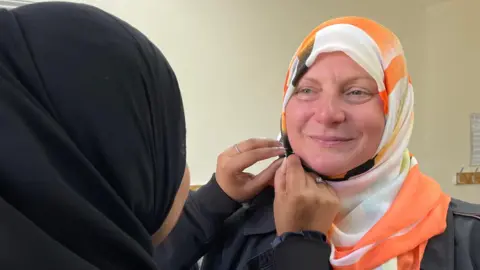 BBC
BBC
When a riot broke out in Hull in August, fear gripped members of Muslim communities. Two months on, people who have lived in the city for decades still feel they are looking over their shoulders, but are reaching out to others to build understanding, as the BBC’s Jo Makel discovers.
Pink and blue bunting decorates the railings. Balloons line the path to the front door.
Inside the Jame Masjid, I’m met with tea, hot samosas and warm smiles.
The mosque in Hull’s Pearson Park has had a community open day for several years. But after this summer’s riot, it has never felt more important.
“We want to make people more comfortable with our religion,” says one woman, who tells me she is still “looking over her shoulder”.
People here need reassurance that the events of 3 August were a one-off.
“When the riots happened, it really was impactful,” says Bulbul Miah, the mosque secretary.
“We’ve lived in Hull for 30 years, if not more. We’ve never seen something like this happening in the city. So, it was really an eye-opener – and scary.”

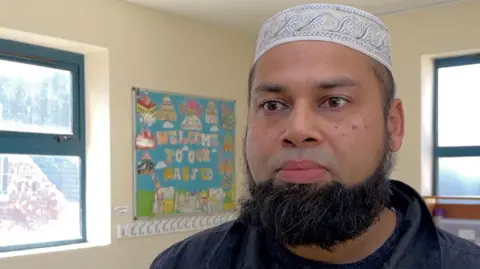
On that Saturday, an anti-immigration protest in the city centre was followed by 12 hours of mass disorder. A large crowd threw missiles at a hotel housing asylum seekers, and at police officers outside.
Shops were broken into and looted, while a garage owner hid in his shop with his wife and two children as cars outside were set alight.
A group of Romanian men were terrified as a mob attacked them and their BMW.
A mosque on Spring Bank, close to the city centre, was a target too.
Bulbul tells me there is concern about the possibility of a further “Stop the Boats” protest, following posts on social media.
“There is a bit of tension around still. You think, it may happen again,” he says.
“Slowly, slowly, people are starting to try and normalise their [lives] and it’s very important that we need to try and continue our lives. We are all part of the community.”
The shock of the summer is coupled with sadness – this congregation had felt established and accepted.
A stained-glass window on the staircase is a reminder that the building was once a Methodist chapel. But the Jame Masjid was set up nearly 40 years ago. Now there are prayer rooms, classrooms and Hull’s first Islamic dome.

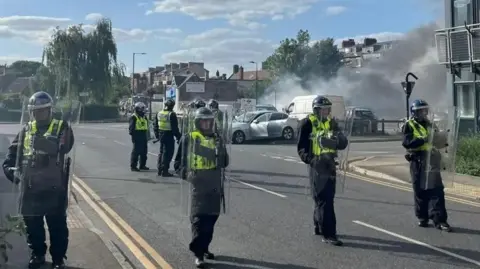
Upstairs, women are demonstrating how to wear a hijab. They fasten scarves on their visitors’ heads with a neat, pearl-topped pin.
Young children excitedly show me their sweets and ask me questions about my camera and microphone. Every answer is met with a curious, “Why?”.
The conversations remind me that in the week after the riot, parents felt too scared to send their children to a summer play scheme. They are still wary.
Three women agree to speak to me. They are nervous, so I film them with their backs to the camera.
“Hull’s been my home for almost 20 years,” one woman tells me. “But I’ve never felt as uncomfortable and shaken up and distressed as I did after the riots.
“It’s still taking a while to just feel safe again. You always have that feeling that, you know, you’re looking over your shoulder. You’re always wondering, is it safe?”
Another adds: “Just like anybody else, we should be able to feel free and happy.
“Hull is very diverse. We have lots of different communities here and live pretty well with each other.
“But you are wondering, who could be out there that feels so strongly against something they don’t even know about. It’s going to take time.”

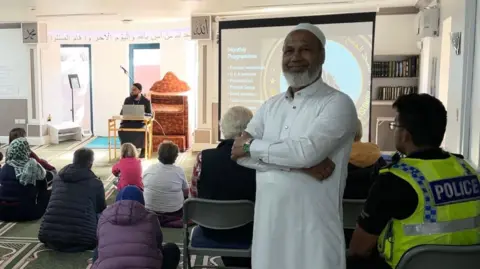
Humberside Police has made 95 arrests and 54 people have been charged. Those already dealt with are serving prison sentences totalling more than 72 years.
The force has said it hopes the swift justice will bring some reassurance.
Mosque chairman Raj Choudhury says it has been a “very important move”.
“Hopefully, that sends a strong message so that we don’t see any repetition. Because that does not represent us in Hull.”
But he is still concerned by misinformation and, he says, the potential for far-right groups to create disharmony.
He also worries about how events around the world – particularly the escalating conflict in the Middle East – might influence people at home.
“A lot of people are feeling anxious about what is happening in the world and thinking, ‘Where is the humanity in people?’,” he says.
“When all our communities talk to each other, you understand that we are all brothers and sisters.
“We have different lifestyles, but we all want the same for each other. We all want to be happy, safe, successful.”

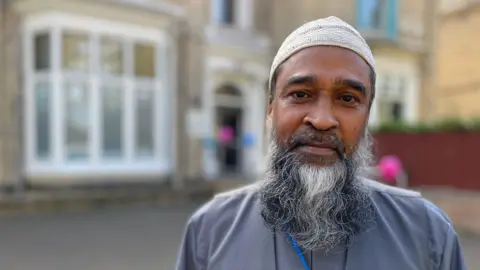
People in Hull have reached out – in particular a community group from nearby Ella Street.
They organised a tea party on the August bank holiday and invited the congregation. There are people from the group looking round the mosque today.
Shaun Blagdon, from the group, says the riots went against everything he believed in.
He says: “I think it’s a combination of cost of living crisis and when people have got problems, looking to blame someone else.”
Listen to highlights from Hull and East Yorkshire on BBC Sounds, watch the latest episode of Look North or tell us about a story you think we should be covering here.








